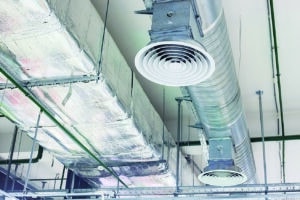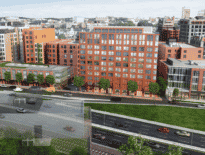
Natural gas-powered HVAC systems and "net-zero" building codes are among the chief bones of contention in Massachusetts' carbon emissions debate.
After months of negotiations, arm-twisting and some testy back-and-forth, legislators and the Baker administration were able to celebrate the state’s new ambitious climate law last spring. On Wednesday, one of the more contentious issues in that debate resurfaced and showed that implementing the law could be as difficult as getting it passed.
Frustrated with what they see as foot-dragging on the part of the Baker administration, lawmakers gave consideration Wednesday to granting cities and towns the power to require that new buildings be built without natural gas, heating oil or propane infrastructure.
The chairmen of the Joint Committee on Telecommunications, Utilities and Energy, Sen. Michael Barrett and Rep. Jeffrey Roy, said before Wednesday’s hearing that they were concerned that the Baker administration has not yet produced a draft of the municipal opt-in net-zero stretch energy code that last year’s climate law requires to be in place by the end of this year.
The Executive Office of Energy and Environmental Affairs “told the public to expect a draft of the code by last fall. But something’s happened. It’s not seen the light of day, and we hear some developers want it weakened,” Barrett and Roy said in a joint statement. “On the off chance the stretch energy code either does not emerge soon or emerges but departs from legislative intent, we’re looking at contingency steps the Legislature may want to take.”
Industry, Environmentalists at Odds
At Wednesday’s hearing, Barrett pointed to a line in the Baker administration’s interim 2030 Clean Energy and Climate Plan, which said the Department of Energy Resources would “present a new high-performance stretch energy code to the Board of Building Regulation and Standards in 2021.” He said the fact that no draft has been presented is a “discouraging early sign of whether or not we’re on track” to live up to the 2021 climate law.
“The Baker-Polito Administration continues to work on updating the commonwealth’s building codes, including the stretch energy code and a specialized code authorized in the 2021 climate legislation, and will issue proposals for these codes for public comment soon,” EEA spokesman Craig Gilvarg said.
The climate law specifically requires DOER to promulgate a new “municipal opt-in specialized stretch energy code” that includes “net-zero building performance standards” and a definition of a “net-zero building” within 18 months, or by late December 2022, and after having held at least five public hearings. The code was a major point of disagreement between the Legislature and governor during debate on the climate law.
Minutes after Gov. Charlie Baker signed the climate law last March, Barrett told the News Service he was concerned that the Baker administration had tried to “evade legislative intent” of the new law. In June, he pointed specifically to the municipal opt-in net-zero stretch energy code provision as an area of concern.
“The framing, verbally, of the administration’s responsibility here by others in the administration has tended to drop the words ‘net-zero’ out of the conversation, which is really strange because we not only require in statute that there be a definition of net-zero building, we also require that there be, and I’m quoting from the statute, ‘net-zero building performance standards’ promulgated by the end of 2022,” Barrett said. He added, “So there’s still a difference between legislative intention, which is pretty clear, and what the administration says it intends to do with drafting the net-zero stretch energy code.”
Arlington Town Manager Adam Chapdelaine echoed that point at Wednesday’s hearing when he said that he is “deeply concerned that when the stretch code is promulgated, it will fall far short of meeting the challenges before us.”
Real estate developers repeatedly warned in past confrontations that natural gas bans would seriously hurt the state’s booming life science construction and cripple residential development. Electrically-powered heating and cooling technology was not cost-competitive with natural gas-powered systems, they said, and in some cases was not powerful enough to supply large buildings.
However, a spate of recent proposals, including life science and office developments, have included more and more carbon-free systems, with Moderna’s under-construction Kendall Square headquarters even deploying a field of geothermal wells on the property to power its HVAC systems.
Bills Would Give Towns New Powers
On Wednesday, the TUE Committee gave a hearing to a pair of bills (H 2167/S 1333) that would give cities and towns the option of requiring all-electric buildings if they choose to do so, without having to first petition the Legislature. The bills got a hearing before the Committee on Municipalities and Regional Government in July and earlier this month were discharged to the TUE Committee.
Rep. Tami Gouveia, who filed the legislation with Sen. Jamie Eldridge, said Wednesday that it is about “municipalities wanting to be really bold and innovative around the climate change crisis and really wanting to take responsibility.”
“What has become clear both in the comments that my colleagues have already stipulated here as well as through conversations with many climate activists at the municipal level is just how much the state is in the way of them being able to take some of that bold action,” Gouveia said.
Eldridge said Wednesday that he would like to see the TUE Committee “also take further action given that the administration has missed yet another deadline.”
“About 27 percent of statewide greenhouse gas emissions come from commercial and residential buildings, so that’s significant. And I do think we need to go beyond the opt-in stretch energy code that’s in the next generation roadmap law,” he said. “So I’m hoping we can take further action in the session on a climate bill and that these initiatives can be included in that bill through the committee’s work.”
Also on the agenda for Wednesday’s TUE Committee hearing were five home rule petitions — filed by Acton, Arlington, Brookline, Concord and Lexington — seeking to be allowed to prohibit fossil-fuel infrastructure in new buildings or those undergoing major renovations within their borders.
“We and the other towns before the committee are ready to move forward and we should be allowed to do so. But others who wish to follow in our footsteps should have a better procedure than seeking special legislation in each case through a home rule petition,” Chapdelaine of Arlington said.






